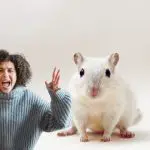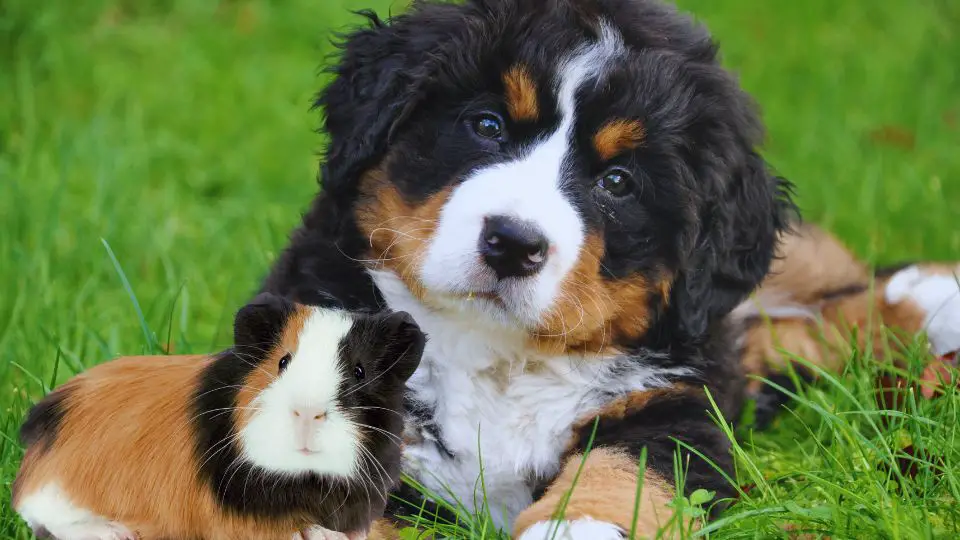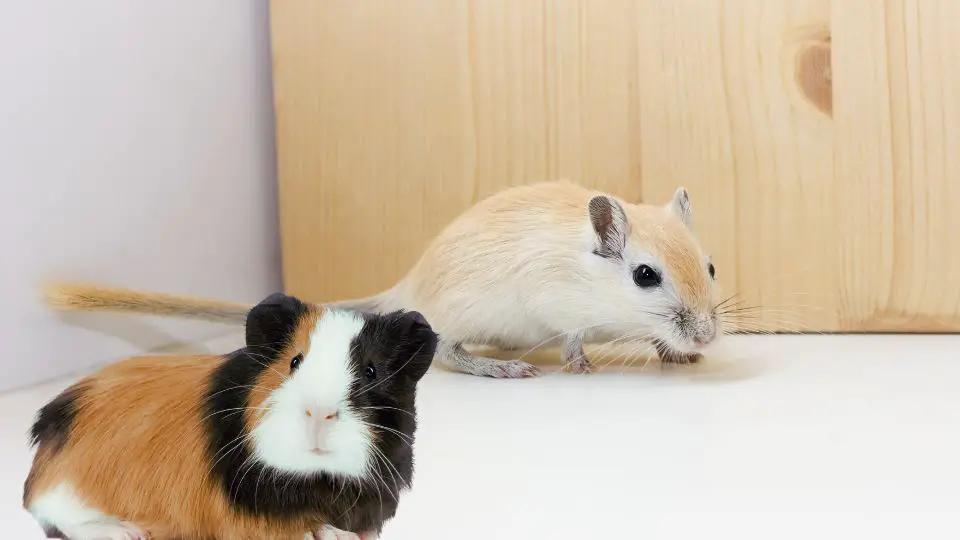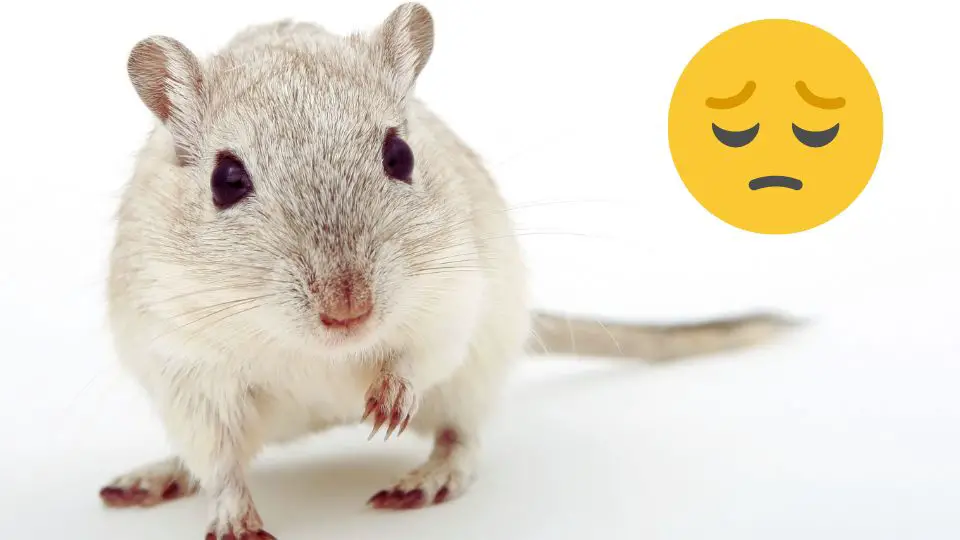Are gerbils social creatures that require companionship, or can they thrive when kept alone? This question often arises among gerbil owners who are considering their pet’s well-being.
Understanding the social nature of gerbils and their natural behavior is essential in determining whether a gerbil can live a fulfilling life as a solitary pet.
In this article, we will explore the pros and cons of keeping a gerbil alone and provide insights into alternative options to ensure their happiness and overall well-being.
Can a gerbil Live Alone?
Gerbils are highly social animals and thrive best when kept in pairs or small groups. While they can technically survive alone, they may experience loneliness, boredom, and behavioral issues. Therefore, it is generally recommended to provide gerbils with a companion for their overall well-being and happiness.
I had a gerbil named Charlie who seemed lonely and less energetic. After research doing some research, I decided to introduce another gerbil as a companion. Charlie’s mood quickly improved as they played, groomed, and snuggled together. Having a companion brought out the best in Charlie, making him happier and more active. So from my experience, I witnessed the positive impact of introducing a gerbil companion on their well-being.
If your gerbil shows signs of loneliness, consider getting them a suitable companion and consult an expert for guidance. Each gerbil is unique, so observe their interactions and be prepared to make adjustments. The joy of seeing your gerbil content and fulfilled in the company of a companion is truly rewarding.
But introducing a new gerbil to an existing one should be done carefully to ensure a smooth transition. Proper introduction protocols, such as gradual scent swapping and supervised neutral territory meetings, should be followed to minimize stress and potential conflicts.
Gerbil Social Behavior
In their natural habitat, gerbils live in groups called clans or colonies. These groups can consist of several individuals, typically with a dominant pair as the leaders. Living in groups offers several advantages, including increased protection against predators and improved foraging and grooming opportunities. Gerbils rely on social interactions to fulfill their natural behaviors and satisfy their social needs.
Social hierarchy and communication within a group
Within a gerbil group, a social hierarchy exists, which helps maintain order and minimize conflicts. The dominant pair usually takes on leadership roles, making important decisions and protecting the group. Other gerbils in the group establish their positions within the hierarchy based on age, size, and assertiveness. Communication among gerbils is primarily non-verbal, relying on body language, scent marking, and vocalizations.
Gerbils use scent marking to establish their territory and communicate with each other. They have scent glands located on their belly and chin, which they use to mark objects and individuals in their surroundings. This marking behavior helps establish the group’s identity and strengthens social bonds.
In addition to scent marking, gerbils communicate through a range of vocalizations, including chirping, squeaking, and drumming their feet. These vocalizations serve various purposes, such as signaling danger, expressing contentment, or indicating aggression. By understanding these communication cues, gerbil owners can better interpret their pets’ needs and emotions.
Solo Gerbil Considerations
While gerbils thrive in social settings, there are instances where a gerbil may need to live alone. This could be due to the loss of a cagemate, aggressive behavior towards other gerbils, or if a suitable companion cannot be found. In these cases, providing a gerbil with a comfortable and enriching solo environment becomes crucial.
Loneliness and Lack of Social Interaction
Gerbils are highly social animals, naturally living in small groups or pairs in the wild. When kept alone, they may experience feelings of loneliness and lack of social interaction. Gerbils thrive on companionship and rely on socializing with other gerbils to fulfill their social needs.
In our experience, having a solitary gerbil can lead to stress, depression, and behavioral issues due to the absence of social stimulation.
Reliance on Human Interaction
When living alone, gerbils become more dependent on human interaction to fulfill their social needs. While owners can provide companionship, playtime, and interaction, it’s important to recognize that human interaction cannot fully substitute the benefits of socializing with other gerbils.
Gerbils may require increased mental and physical stimulation from their human caregivers to prevent boredom and ensure their well-being.
Suitability of Individual Gerbils
Not all gerbils are suitable for living alone. Some gerbils have strong social instincts and may struggle to adapt to a solitary lifestyle. It’s crucial to observe your gerbil’s behavior and monitor their well-being closely.
If you notice signs of stress, depression, or persistent behavioral issues, it may be necessary to reconsider keeping them alone.
Benefits of Keeping Gerbils in Pairs or Groups
There are several benefits to keeping gerbils in pairs or groups, allowing them to socialize and interact with their own kind. In this article, we will explore the advantages of companionship for gerbils and the positive impact it has on their well-being.
Companionship and Social Bonding
Gerbils are naturally social animals and thrive in the company of their own kind. Keeping gerbils in pairs or groups allows them to form strong social bonds and engage in natural behaviors, such as grooming, playing, and communicating. These social interactions provide them with companionship, emotional support, and a sense of belonging.
Mental Stimulation
Social interaction with other gerbils provides mental stimulation for these intelligent creatures. They engage in various activities together, such as exploring their environment, building tunnels, and engaging in playful behaviors. This mental stimulation helps keep their minds active and prevents boredom, which is essential for their overall well-being.
Emotional Well-being
Gerbils in pairs or groups experience a greater sense of security and emotional well-being. They have constant access to social interaction and can rely on each other for comfort and support. This reduces feelings of stress and loneliness and promotes a more balanced emotional state.
Natural Behaviors
Living with other gerbils allows them to engage in their natural behaviors. They can establish hierarchies within their group, playfully interact, and communicate through body language and vocalizations. These behaviors are important for their overall development and help them express their natural instincts.
Health Benefits
Having companionship has positive effects on the physical health of gerbils. Socially housed gerbils are more active, which contributes to better muscle tone and overall fitness. They also groom each other, helping to maintain good hygiene and reducing the risk of skin issues or excessive self-grooming.
Reduced Stress
Being with their own kind helps gerbils feel more secure and reduces stress levels. They have a natural support system within their group, which helps them cope with various environmental stressors. This can include loud noises, changes in routine, or unfamiliar surroundings.
Alternatives to Keeping a Single Gerbil
While gerbils are social animals and generally thrive in pairs or groups, there may be situations where keeping multiple gerbils is not feasible or suitable. In such cases, there are alternatives that can help provide companionship and stimulation for a single gerbil.
- Human Interaction: As a gerbil owner, you play a crucial role in providing social interaction and companionship for your gerbil. Spending quality time with your gerbil, such as handling, playing, and providing gentle affection, can help alleviate their loneliness. Regular interaction and bonding activities can strengthen the human-gerbil relationship and fulfill their social needs.
- Enrichment and Stimulation: Keeping a single gerbil means that they rely more on their environment for mental and physical stimulation. Provide a variety of toys, tunnels, climbing structures, and hiding spots to keep them engaged and entertained. Rotate their toys regularly to keep things interesting. Additionally, offer opportunities for foraging and exploring, such as providing treat puzzles or hiding treats around their enclosure.
- Mirror or Stuffed Animal: Introducing a mirror or a small stuffed animal can offer some visual stimulation and the illusion of companionship for your gerbil. However, it’s important to monitor their reactions and remove the mirror or stuffed animal if it causes stress or aggressive behavior.
- Gerbil Playdates: Consider arranging supervised playdates with other gerbil owners. This allows your gerbil to have brief interactions and socialization with other gerbils in a controlled and safe environment. Be sure to follow proper introduction procedures and monitor their interactions closely.
Remember, while these alternatives can help alleviate some of the social and stimulation needs of a single gerbil, they do not fully replace the benefits of companionship with another gerbil.
Conclusion
While gerbils are naturally social animals that thrive in pairs or groups, there may be circumstances where keeping a gerbil alone becomes necessary. While some gerbils may adapt well to solitary living, it’s important to acknowledge the potential challenges and provide adequate social interaction, mental stimulation, and enrichment to prevent loneliness and boredom.
Whether it’s through human companionship, careful environmental design, or occasional playdates, gerbil owners can find alternatives to ensure their pet’s emotional well-being when living alone. However, it’s always recommended to consult with a gerbil expert or veterinarian to assess your specific gerbil’s needs and make informed decisions regarding their care and social requirements.
Ultimately, prioritizing your gerbil’s happiness and providing a stimulating and nurturing environment will contribute to their overall health and contentment, whether they live alone or with companions.







